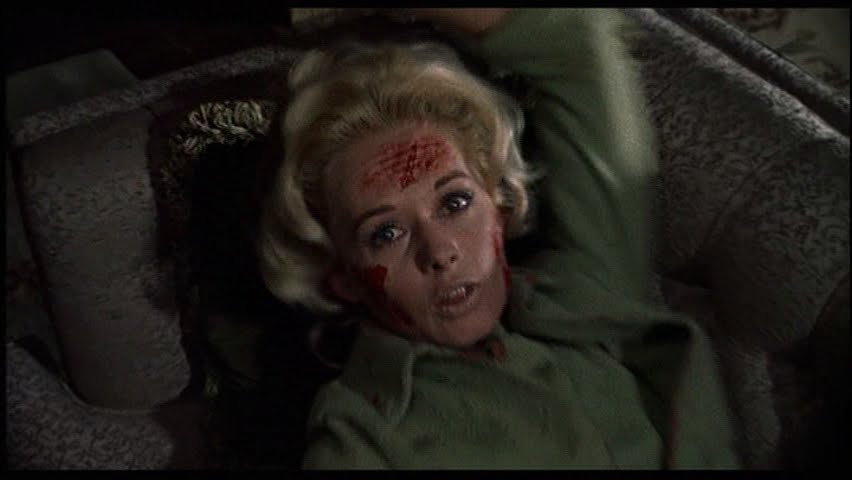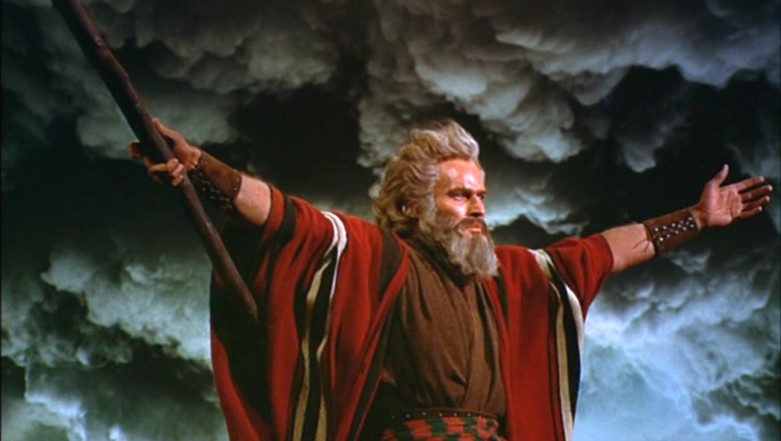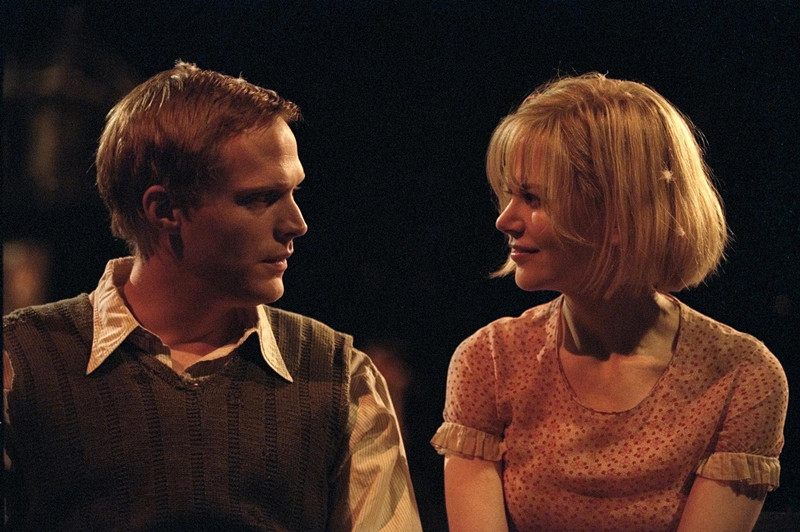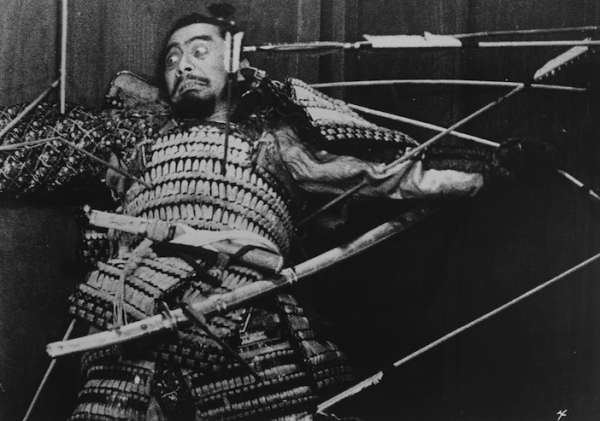8. Alfred Hitchcock: The Sadistic Prankster
Those who know a little bit about Hitchcock behind the scenes, know that he wasn’t as endearing as Anthony Hopkins portrayed him in ”Hitchcock.” The film portrays a particular loving relationship between him and his wife Alma, who is his strong anchor during the making of what would become one of his greatest movies; Psycho. From a narrative standpoint, it’s obvious why it was portrayed this way; it gives the film much needed heart.
The film does show flashes of his love for blondes, but in the same year another film about Hitchcock was released called The Girl, which portrays his love for blondes as something completely disturbing. The film details Tippi Hedren’s predatory abuse in the hands of the director during the filming of The Birds, destroying her career when she refused his advances.
The film was met with a lot of controversy at the time, unsurprisingly so; it tarnished the reputation of one of the most influential directors of our time, and made many wonder whether they could watch The Birds ever the same again.
Hitchcock’s persona, like many of the most famous directors of cinema history, is fueled by myth. There’s no denying that Hitchcock enjoyed his own brand of myth and encouraged it everything opportunity, especially when he started the anthology TV-show Hitchcock presents.
The stories of his behind the scenes antics as a merciless prankster are well documented; he would exploit the phobia’s of the cast and crew, sending them boxes of one of their particular phobia’s for his amusement. His targets were often people he would refer to as ”phonies” or ”bigheads”, he would invite them to his home, serve them off-colored food and watch how they react. Sometimes he would give them strong alcohol and relish their inability to control themselves.
In one of his most famous and disturbing pranks, was the bet he made with a crewmember for a week’s salary. Hitchcock bet him that he couldn’t spend a night in a deserted and darkened studio, when the crewmember accepted, Hitchcock clasped his cuffs and offered him a brandy for the night.
It would seem like a nice gesture, but the next morning people found him weeping and covered in his own feces- apparently Hitchcock had laced the brandy with the strongest laxative possible.

Hitchcock’s name is synonymous with cinema and nearly any director who attempts to make a suspenseful film will have to own to his legacy. But someone’s genius craft never excuses their behavior.
It is widely known that Hitchcock wasn’t a social animal, spending most of his days inside with his wife and daughter. Reports have surfaced that he has claimed at one point to not have had sex for three decades, and some scholars postulate that it was his sexual frustration was the cause for his sadistic pranks and sexual harassment.
Even so, it should be noted that the screen-writer of The girl, Gwyneth Hughes, warns us to not outright dismiss the director: ”I’m a huge fan of Hitch, I love his work. I didn’t want him to be a monster at all. Hitch was sexually obsessed with Tippi. But at the same time he was impotent, terrified of sex and consumed with a revulsion of his own body. He was a sad old man who more than met his match with Tippi.”
None of the great filmmakers on this list are monsters but like children, if you indulge them too much, you shouldn’t be surprised when they start thinking that they can get away with everything.
7. Cecil B. Demille: The Moral Crusader
It would be interesting to think about what Cecil B. Demille’s opinion would be about the latest big budget Hollywood bible epics; as both Darren Aronofsky’s Noah and Ridley Scott’s Exodus: Gods and Kings take a rather unconventional approach to the classic stories. Especially the latter with its agnostic overturns would probably not be accepted by Cecil who, despite the glamour and glitz of his own biblical epics, took the material very seriously.
In his own words, he made his religious spectacles in order to ”get more people to read the bible than anyone else ever has.” During the sets of his films, he required the cast and crew to take his devout example, sermonizing them about the importance of the story.
In The Kings of Kings, the actor H.B. Warner was required to sign a five year contract to not do anything ”unbiblical”- obviously this extended well beyond the shoot. In that same film he would preach for over six hours, leading them into prayer during the pivotal crucifixion scene.
Sadly, even with his staunch support for conservative values, he often betrayed them. He would have several affairs throughout his career and had a rather cavalier attitude to the safety of his cast and crew. Chastising those who were not willing to perform dangerous stunts. Jack Montgomery, who was a stuntman in Demille’s The Crusades, was horrified with his indifference on the set- leading to the death of several horses.

His own religious belief led him to support a few questionable political figures such as Herbert Hoover -a known white-supremacist and one of the creators of the Southern strategy- and Joseph McCarthy. Demille would support McCarthy’s practices of blacklisting in Hollywood so much so, that he did not shy away from tipping of a few of his colleagues either.
In the end, Cecil B. Demille is a textbook case of a moral crusader who is often blind to his own sins. But even with his own blindness, his dedication should not be ignored.
During the making of his final epic (a remake of his earlier film) The Tenth Commandment, he suffered a heart attack and though the doctor advised him two weeks of rest, he went back to the set anyway. He would die not long after, suffering various heart attacks until his final breath. Many great spirits haunt the ruins of Old-hollywood, but if there’s one that can’t be ignored it’s Cecil B. Demille’s.
6. Lars von Trier: The Depressive
There’s a moment at the end of Nymphomaniac Part 2, where after the main character is finally done telling her story which was filled with depravity and sadness, there seems to be room for a little light, a little warmth at the end of her journey…. But since it’s a Lars von Trier film, it has to end on such a puzzling nihilistic punchline that it veers into absurdity.
Nymphomaniac Part 1-2 (though one should consider it as one whole film) is nearly a parody on his style of filmmaking, going all out on trademark explicit sex-scenes and nihilistic themes.
The film seems almost tailored made to induce controversy, but that has always been his style. Anybody who knows Lars, knows he loves almost nothing better than to provoke an emotional reaction from his audience.
Like most of von Trier’s other films, Nymphomaniac belongs a thematic trilogy, preceded by Antichrist and Melancholia, this latest trilogy concerns the subject of depression. When he was interviewed by notable movie-reviewer Mark Kermode about the controversial themes of Anti-christ and Melancholia, he answered very honestly; ”I can’t tell you why but they are both about my mental condition.”
Lars has been very candid throughout his career about his mental state, having confessed that his depression has made him at times unable to work. It’s hard to state whether it’s his artistic endeavors or his mental state that caused him to clash with many of his actors. Ben Gazzara who co-starred in Dogville called the director ”insane,” reports of him directing the actors naked during filming certainly isn’t going to be appreciated by anyone.

At the same time, his repertoir is filled with prankster material, so much so that many people have trouble (including Mark Kermode) to take him seriously. Such prankster antics as filling Paul Bettany’s hotel room with porn magazines to embarrass him as he was about to meet Nicole Kidman.And nobody will forget his disastrous joke at The Cannes press conference, when he stated that he sympathized with Hitler. It would be a bad joke that lead him to being banned from Cannes.
And that’s often the problem with trying to understand Lars von Trier; it’s hard to grasp whether his antics are part of strengthening his controversial persona or that its part of his manic state of mind. Maybe it’s a little both, nobody can answers this except for Lars.
What we do know that all of his films are deeply personal, a way to fearly combat his demons. It would be hard to argue that his depression didn’t inspire many of his greatest work. As he said in his own words; ”basically I’m afraid of everything in life, except filmmaking.” And instead of banning such filmmakers from offending our sensibilities, we should applaud them and keep them coming back. Maybe if he stays with us long enough, the punchline of his films will be a much a happier one.
5. Akira Kurosawa: The Emperor
“Look carefully,” said Heigo Kurosawa to his small brother when they visited the gruesome aftermath of the Great Kanto earthquake. He demanded his little brother opened his eyes and face the reality of the situation, as they were confronted by all manner of death.
Years later, this little brother would become one of the greatest filmmakers of the 20th century; Akira Kurosawa. He would entail that this experience was part of an expedition to conquer his fear. Whether or not, this is true, there’s no denying the effect it had on both his filmmaking and his perception of humanity.
There’s also the tragedy of his elder Brother Heigo, who had been a silent film narrator and with the advent of talking pictures committed suicide. Shortly thereafter he lost his other brother and sister due to illness. All of this as Japan was going through a tumultuous time in history, definitely influenced the darkness of many of his pictures.
That’s not to say Kurosawa’s films were all depressing faire- many of his films have the Capra-esque quality that he enjoyed so much for his love of American cinema. But if his films would have moments of intimacy and warmth, it would stay truthful to what he believed an artist should never do which is to ”avert one’s eyes.” Just like his brother taught him on that faithful day.

Yet, one wonders how such a code could affect one’s character. Akira was a meticulous filmmaker, a workaholic who when he was home, still busied his mind with film. He had the perfect eye for cinema, but owning this does not mean that the world around will adhere to your vision.
In typical fashion, like many of the perfectionists on this list, he would order roofs from houses to taken out because it wouldn’t look good in a shot, would large sets just for a few shots and then taking him down and most famously, put the life of Toshiro Mifune in danger during the climax of Throne of Blood as he had to duck real arrows shot by by professional archers.
He could sometimes be cruel to his cast and crew, there is the famous incident of him singling out Yoshio Inaba for his verbal abuse, this was in order to push the rest of the cast to create better performances. Many of such incidents would cause him to receive the nickname of Teno; which is Japanese for emperor.
Maybe he didn’t mind treating his crew this way, as his view on humanity is certainly not glamorized. It’s often the individual, the rogue character that is praised in his films, the one that dares to see the world for what it really is and works hard to do the right thing. He believed that “human beings are unable to be honest with themselves about themselves,” and that “if we were not honest with themselves, we will never able to make decent films.”
One could deduce that honesty stood higher in his list of priorities than being kind every moment of his life. But regardless of his cruelty, there’s nearly no prolific director that has to admit some debt to the master, both in technical to storytelling aspects. And if he were alive today, there is no denying that any ambitious filmmaker, no matter the possible abuse they will have to endure, would be dying to work with him.